Forgetting is a natural part of learning, but it doesn't have to be a constant struggle. The core problem isn't your memory; it's the method you use to retain information. I remember spending countless nights before exams, rereading highlighted textbooks until my eyes blurred. I'd ace the test, only to forget most of it a week later. Spaced repetition systems (SRS) solve this by scheduling reviews at the precise moment you're about to forget something, strengthening neural pathways and making knowledge stick permanently. This principle, grounded in cognitive science, is the engine behind the most effective learning tools available today.
This guide provides a detailed breakdown of the best spaced repetition apps, helping you move beyond inefficient study habits. Whether you're a student preparing for medical school, a language learner aiming for fluency, or a Notion user wanting to integrate active recall into your workflow, this list will help you find the right tool. For example, a medical student might use image occlusion to memorize anatomical diagrams, while a language learner could use audio flashcards to perfect pronunciation.
You'll find an honest assessment of each app's strengths and limitations, complete with screenshots and direct links to get started. We'll cover everything from the gold-standard customizability of Anki to innovative Notion-integrated solutions like Zorbi and PDFFlashcards. My goal is to equip you with actionable insights to choose the perfect app for your specific learning goals, saving you time and dramatically improving your ability to remember what you learn.
1. Anki
Anki is a foundational tool in the world of spaced repetition apps, often considered the gold standard by dedicated learners. It’s an open-source, highly customizable flashcard program that gives you complete control over your study material and review schedule. This level of control is its main differentiator; you can tailor everything from card appearance with HTML/CSS to review intervals. For instance, when I was studying for a professional certification, I adjusted the algorithm's "new interval" setting to 70% to ensure that when I re-learned a failed card, it would reappear more quickly than the default setting, which was critical for difficult concepts.
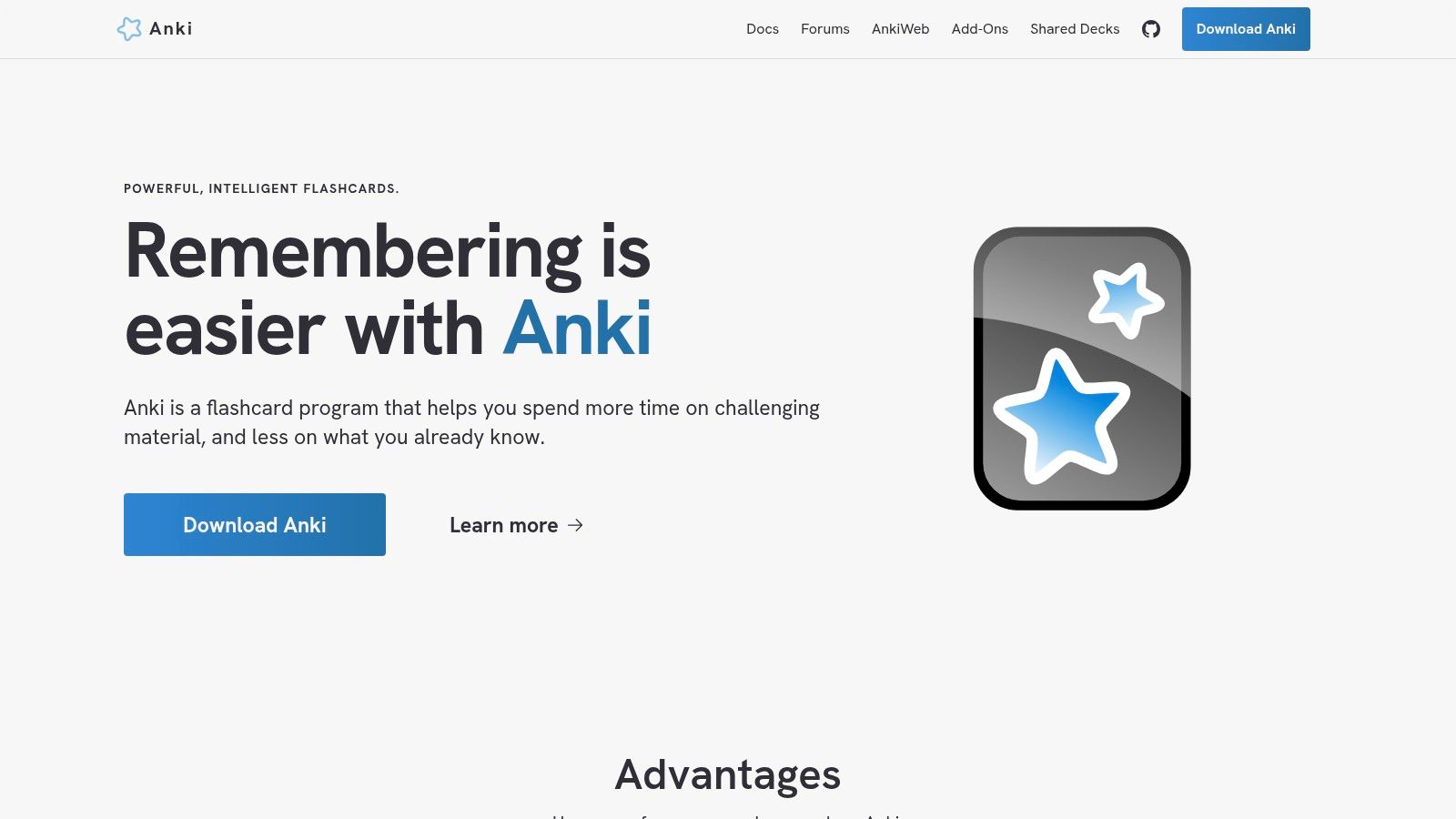
Why Anki Stands Out
What makes Anki unique is its robust customization and massive community. Users aren't limited to simple front-and-back cards; you can create cloze deletions (fill-in-the-blanks), image occlusions, and embed audio or LaTeX formulas. The community has developed hundreds of free add-ons that extend its functionality. A practical example is the "Image Occlusion Enhanced" add-on, which lets you block out labels on a diagram (like the parts of a cell) and test yourself on each one individually—a game-changer for anatomy students.
Key Considerations
- Best For: Power users, medical students, and language learners who need deep customization.
- Pros: Completely free on desktop and Android, endless customization via add-ons, and a vast library of user-created decks.
- Cons: The interface has a steep learning curve, and the official iOS app costs $24.99 (a one-time purchase).
Website: https://apps.ankiweb.net/
2. SuperMemo
SuperMemo is the original pioneer of spaced repetition software, with its roots tracing back to research conducted in the 1980s. It is more than just a flashcard app; it's a comprehensive learning system built on decades of scientific research into long-term memory. The platform’s core philosophy revolves around its highly sophisticated algorithm and a unique feature called "incremental reading," designed for processing and retaining vast amounts of complex information from articles and books. This makes it a serious tool for lifelong learners and researchers who need to master entire fields of knowledge, not just individual facts.
Why SuperMemo Stands Out
SuperMemo’s main differentiator is its powerful incremental reading feature. Instead of just making flashcards, you import entire articles or digital books. The software then helps you break them down into digestible chunks, creating flashcards and scheduling reviews for both the new extracts and the original articles. For example, a historian could import a 50-page academic paper on the Roman Empire, highlight key arguments, and turn them into questions. SuperMemo would then schedule reviews for those specific questions, while also prompting them to review the entire article at longer intervals, ensuring both detail and context are retained.
Key Considerations
- Best For: Academics, researchers, and dedicated learners who want to master large volumes of text-based material.
- Pros: Backed by extensive scientific research, its incremental reading feature is unparalleled for deep learning, and the algorithm is extremely precise.
- Cons: The user interface is notoriously outdated and complex, presenting a very steep learning curve for new users. It is a Windows-only desktop application.
Website: https://www.supermemo.com/
3. Memrise
Memrise blends language acquisition with gamification, making it one of the most engaging spaced repetition apps available. It moves beyond simple flashcards by incorporating videos of native speakers and mnemonic devices (called "mems") to help you form stronger memory associations. I found this incredibly helpful when learning Japanese; hearing the subtle pitch accents from different native speakers in their videos made a huge difference compared to just a single, robotic audio file.
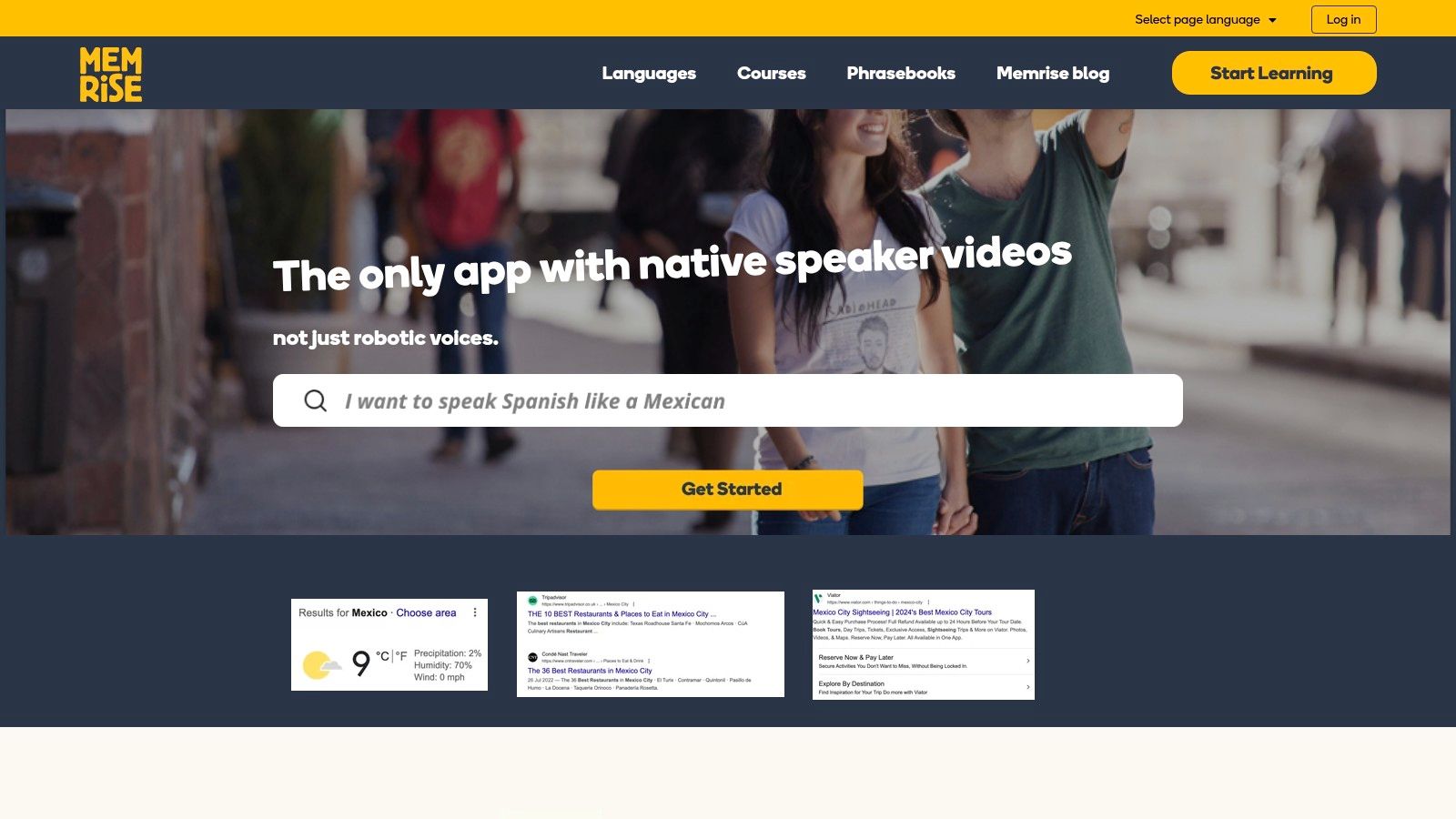
Why Memrise Stands Out
What distinguishes Memrise is its immersive, video-based learning approach. The "Learn with Locals" feature shows you clips of native speakers using words and phrases in context, which helps tremendously with pronunciation and real-world comprehension. The gamified experience, complete with points and leaderboards, keeps you motivated. A practical insight is to use the user-created "mems"—silly images or phrases—to create vivid mental hooks for difficult vocabulary, making them far easier to recall during a review session.
Key Considerations
- Best For: Beginner to intermediate language learners and users who thrive on gamified, visually-driven study.
- Pros: Engaging user interface, extensive library of courses, and integration of videos featuring native speakers.
- Cons: Limited customization options for flashcards and review schedules; some core features are behind a subscription paywall.
Website: https://www.memrise.com/
4. Brainscape
Brainscape approaches spaced repetition with a system it calls "Confidence-Based Repetition." Instead of just marking a card as right or wrong, you rate your confidence on a scale of 1 to 5. This method helps the algorithm determine when to show you a card again, focusing your effort on concepts you find most difficult. It’s an effective system, particularly for learners who want a guided experience without the complexity of manual interval tuning.
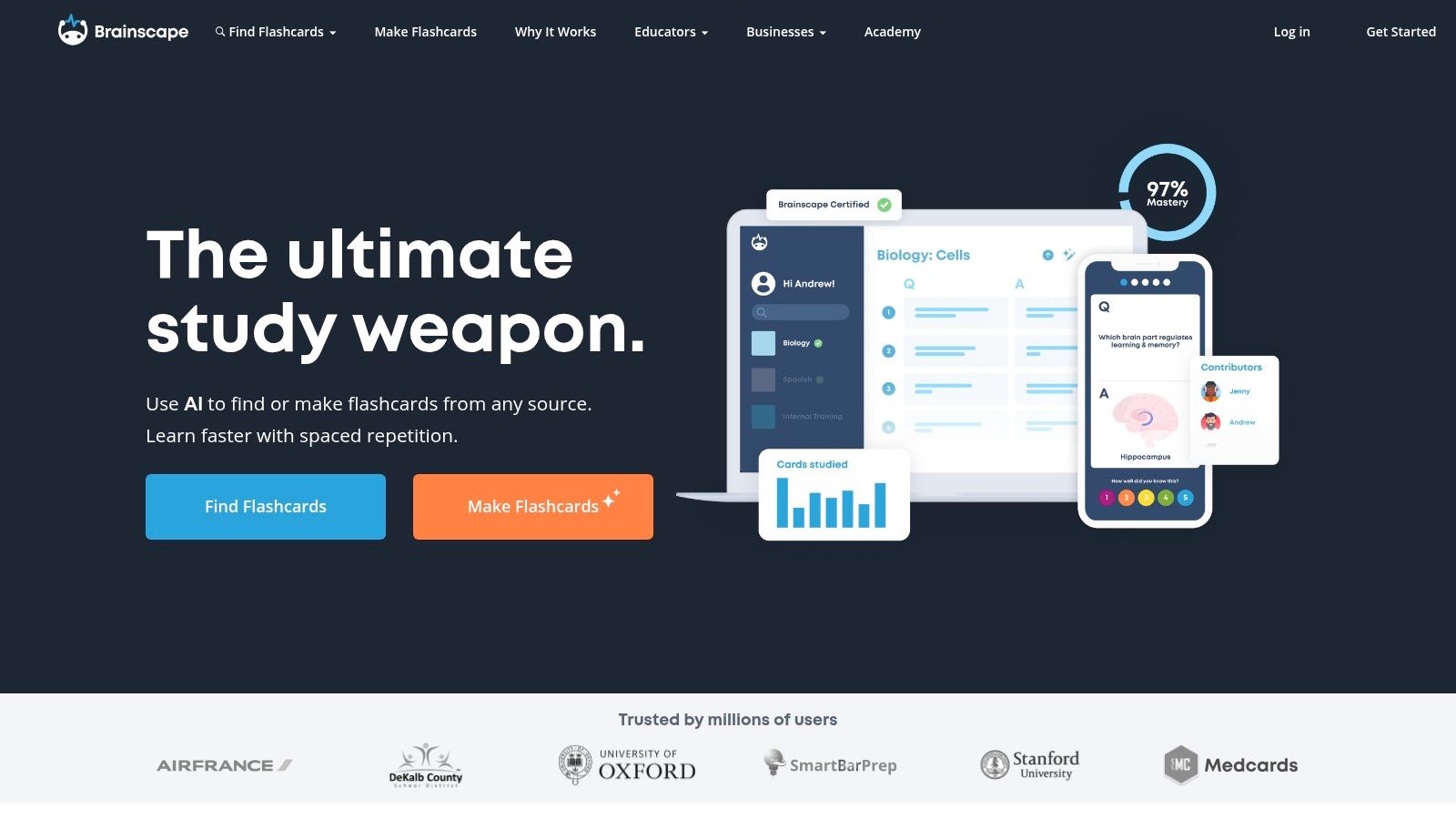
Why Brainscape Stands Out
Brainscape’s key differentiator is its massive library of expert-certified and user-generated flashcards, making it ideal for standardized tests like the MCAT or Bar Exam. Its modern, intuitive interface is far more approachable than Anki’s, offering a plug-and-play experience. For example, a team preparing for a sales certification could use the collaboration features to build a shared deck of product knowledge, then track each other's mastery levels to identify weak spots before a big exam. For students weighing their options, understanding how Brainscape integrates with other tools is crucial; you can learn more about its place among the best note-taking apps to see how it fits into a broader study workflow.
Key Considerations
- Best For: Students preparing for standardized tests, visual learners, and study groups looking for a collaborative tool.
- Pros: Clean and modern user interface, effective confidence-based learning system, and a vast library of pre-made, high-quality decks.
- Cons: Less customization flexibility compared to Anki, and many advanced features and certified classes are locked behind a Pro subscription.
Website: https://www.brainscape.com/
5. Mnemosyne
Mnemosyne is a free, open-source spaced repetition software that positions itself as a scientific research tool as much as a personal learning aid. Named after the Greek goddess of memory, it focuses on collecting user data (anonymously) to improve memory algorithms. This makes it a fascinating choice for those interested in the science behind spaced repetition, as your study habits contribute to ongoing research. It fully supports rich media, allowing for cards with images, audio, video, and even LaTeX for scientific formulas.
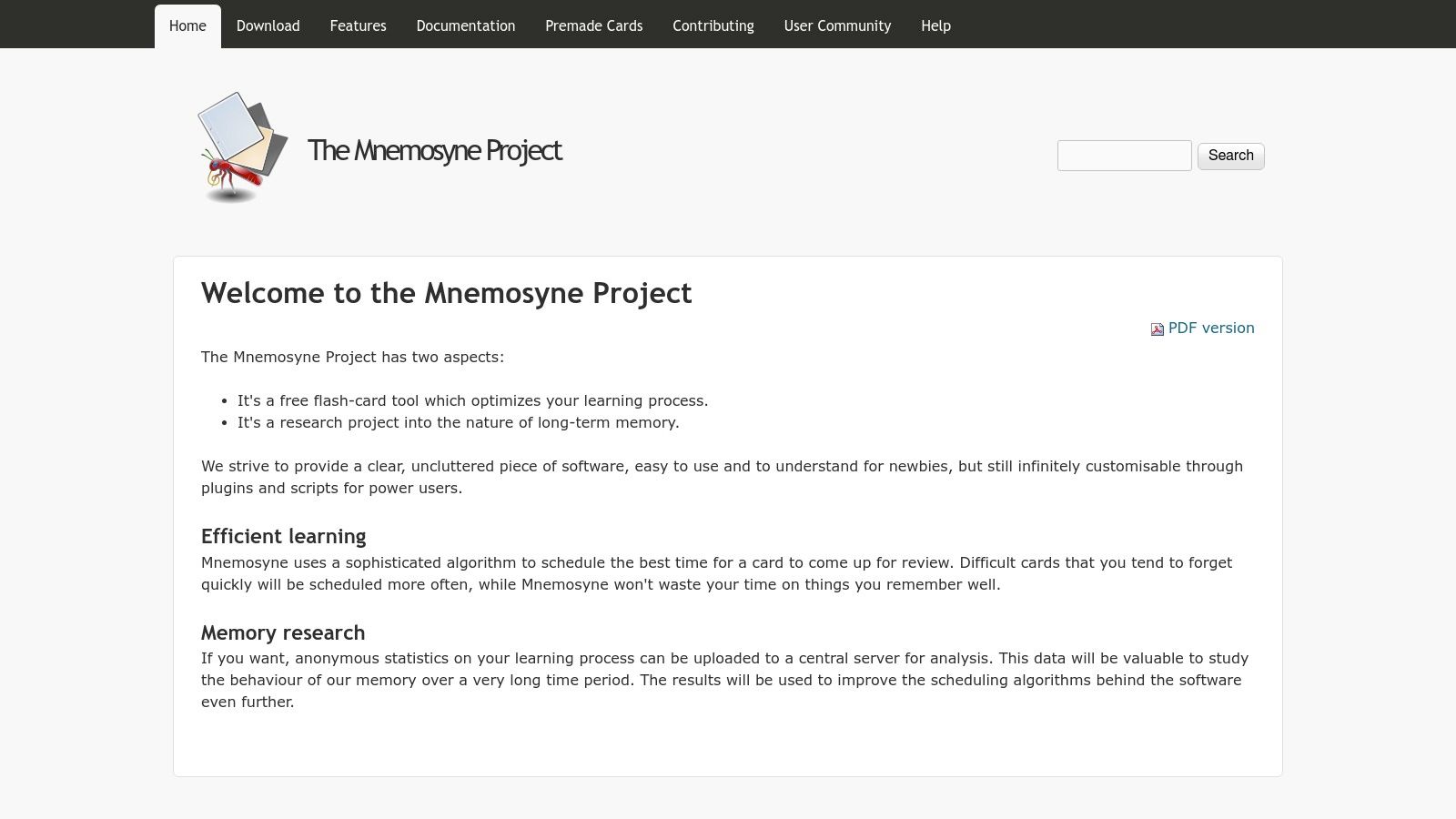
Why Mnemosyne Stands Out
Mnemosyne’s commitment to scientific principles is its core differentiator. The platform provides detailed statistics and graphs on your learning progress and memory retention, offering a more analytical view than many other apps. While less flashy than commercial alternatives, its effectiveness as a spaced repetition app is undeniable. For instance, a physics student could use LaTeX to create precise formula cards and then analyze retention graphs to see which concepts require more foundational review, making their study sessions highly data-driven. This actionable insight helps you adjust your focus from memorizing everything to targeting your specific weaknesses.
Key Considerations
- Best For: Data-driven learners, researchers, and users who value open-source software and want detailed learning analytics.
- Pros: Completely free across all platforms, strong scientific foundation, and provides insightful statistics on your memory.
- Cons: The user interface feels dated, and it has a much smaller community, meaning fewer pre-made decks and less support.
Website: https://mnemosyne-proj.org/
6. iDoRecall
iDoRecall offers a unique approach to spaced repetition by tightly integrating flashcards with your source learning materials. Instead of creating isolated facts, you link each flashcard, or "recall," directly to the specific sentence, paragraph, or diagram in your notes, PDFs, or videos where you learned the information. This method fosters a deeper, context-rich understanding, allowing you to instantly revisit the source material if you struggle with a recall.
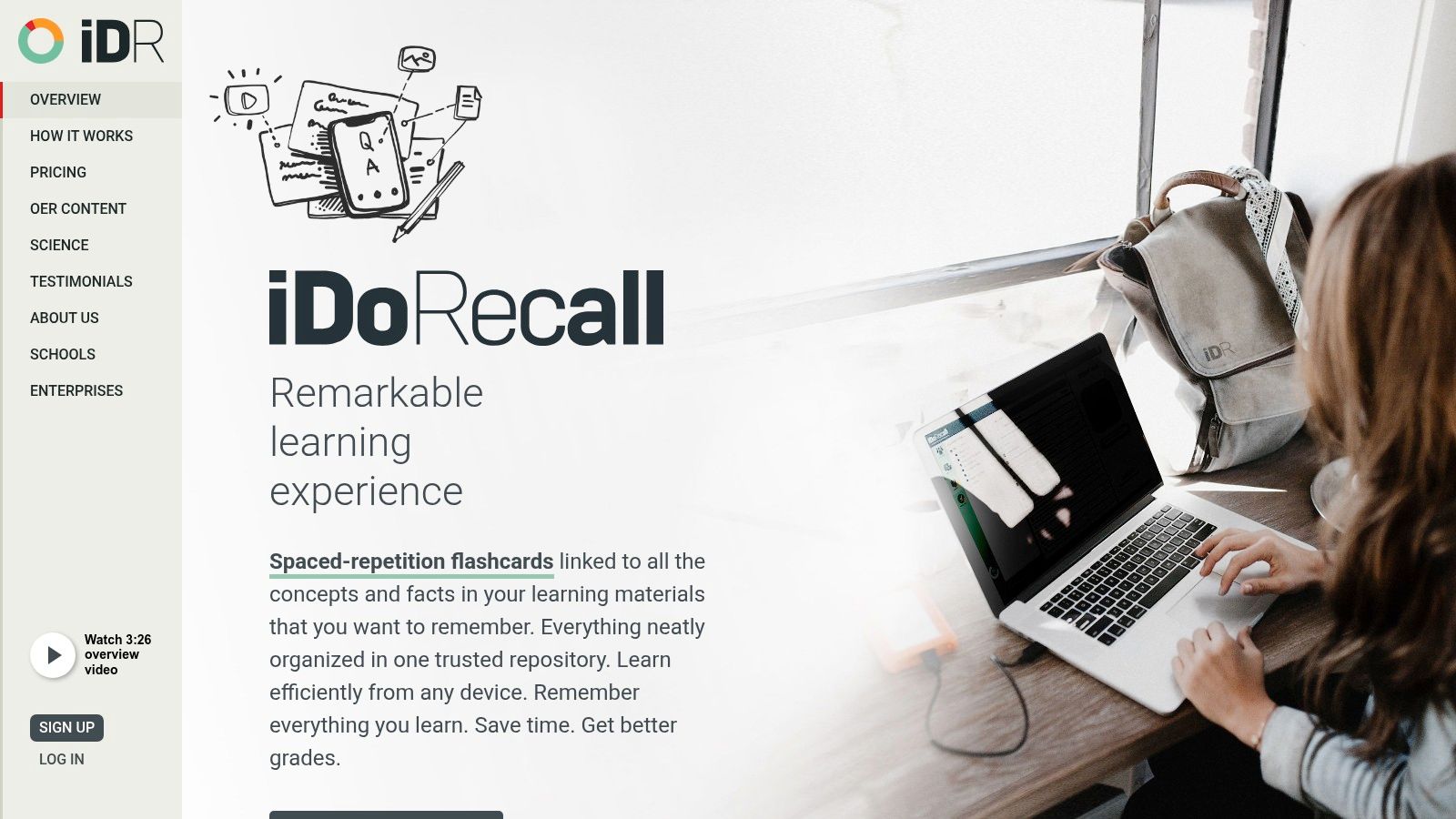
Why iDoRecall Stands Out
The standout feature is its emphasis on contextual learning. When you forget an answer, a single click takes you back to the exact location in your study files. Imagine you're a law student reviewing a case brief. You forget the specific legal precedent cited. With iDoRecall, you click a button and are immediately taken to the exact paragraph in the PDF where the precedent is discussed, refreshing your memory in context. This immediate feedback loop closes knowledge gaps far more effectively than a standalone flashcard.
Key Considerations
- Best For: Students and professionals who learn from dense texts (PDFs, PowerPoints) and want to link their knowledge directly to the source.
- Pros: Seamless integration with personal study materials, encourages active recall with context, and provides strong collaborative and progress-tracking features.
- Cons: The free plan is quite limited, and a subscription is necessary to unlock the full potential, including unlimited files and flashcards.
Website: https://www.idorecall.com/
7. Mochi
Mochi offers a streamlined and aesthetically pleasing approach to learning, blending note-taking with a powerful spaced repetition system. It’s designed for users who want the benefits of SRS without the complexity of platforms like Anki. The app’s core strength is its markdown-first editor, allowing you to create richly formatted notes and seamlessly turn them into flashcards, making it an excellent tool for students and thinkers who build knowledge organically.
Why Mochi Stands Out
Mochi distinguishes itself with an elegant, offline-first design that prioritizes simplicity and focus. Unlike many other spaced repetition apps, it masterfully integrates notes and cards; you can create two-way links between concepts, building a personal knowledge web similar to Roam or Obsidian. This is ideal for synthesizing information. For example, while taking lecture notes on "Photosynthesis," you can create a card for Chlorophyll::The green pigment in plants. Later, when writing about "Plant Biology," you can link back to the [[Chlorophyll]] card, creating an interconnected web of knowledge that you can both study and browse.
Key Considerations
- Best For: Students and lifelong learners who prefer a clean interface and want to integrate note-taking directly with flashcard creation.
- Pros: Beautiful and intuitive user interface, excellent markdown support, and a flexible system for combining notes and cards.
- Cons: Some advanced features like image occlusion require a Pro subscription, and it has fewer community resources compared to Anki.
Website: https://mochi.cards/
8. Zorbi
Zorbi is a modern spaced repetition app designed for students who live in their web browser and Notion. It excels at bridging the gap between your research or notes and your study routine. The platform's core strength is its ability to let you create flashcards directly from online content, including articles, PDFs, and especially your Notion pages, making it a frictionless addition to your existing workflow.
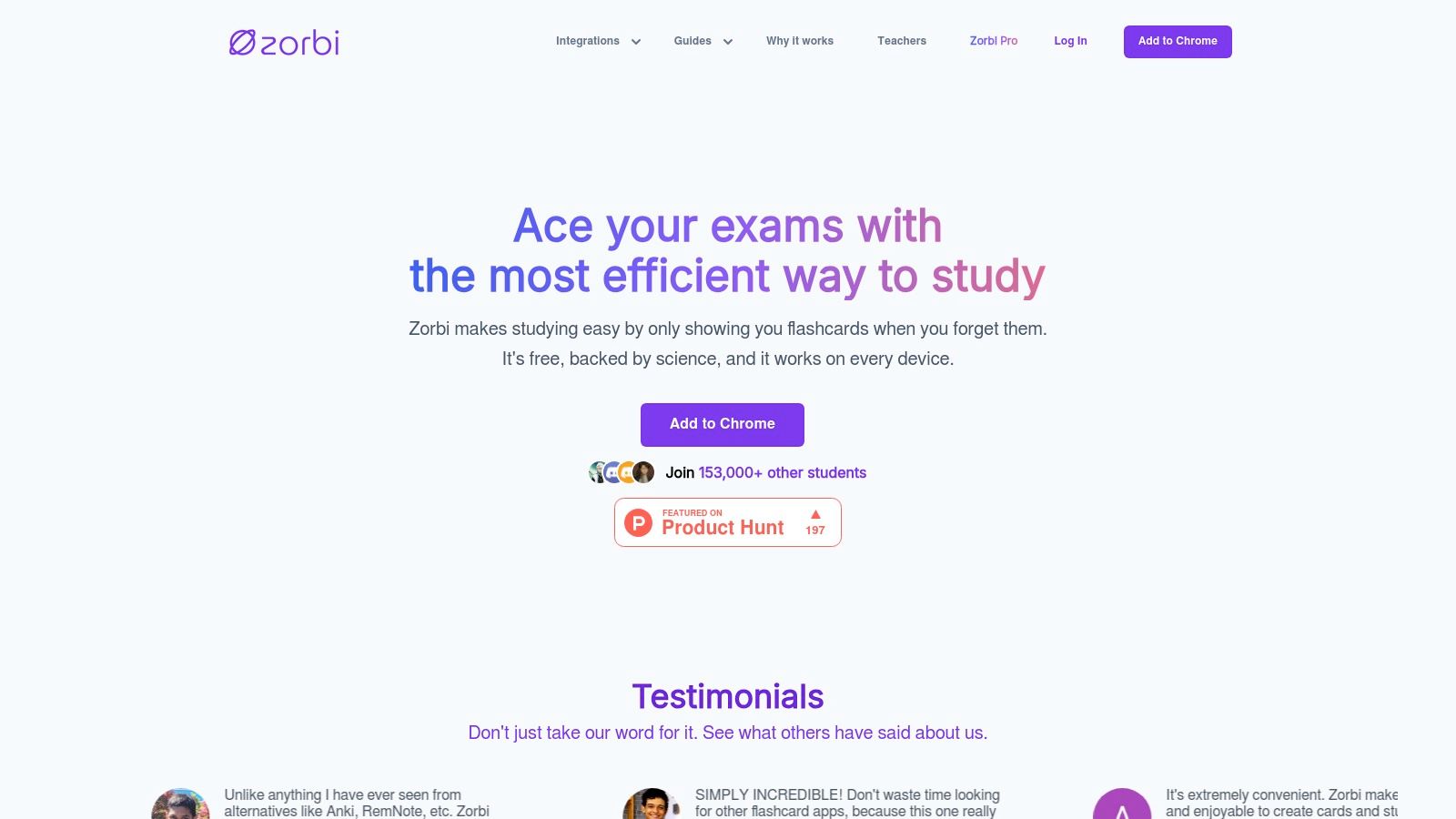
Why Zorbi Stands Out
The seamless integration with Notion is Zorbi's killer feature. By using a simple toggle format (> Question :: Answer) within a Notion doc, you can build entire flashcard decks without ever leaving your notes. The Chrome extension is equally powerful. For example, while reading a research paper online, you can highlight a key statistic, right-click, and send it to your Zorbi deck. This actionable workflow removes the friction of switching apps, capturing information in the moment of discovery and ensuring it gets reviewed.
Key Considerations
- Best For: Notion users and students who want to create flashcards directly from their web-based study materials.
- Pros: Excellent Notion integration, intuitive Chrome extension for easy card creation, and a clean, user-friendly interface.
- Cons: As a newer platform, its feature set is still evolving, and some advanced functionalities are locked behind a Pro subscription.
Website: https://zorbi.com/
9. Rember
Rember is an emerging spaced repetition system that aims to automate the most time-consuming part of creating study materials: making the flashcards themselves. It uses AI to intelligently generate flashcards directly from your notes, documents, or other content. This positions it as a modern, efficiency-focused tool for students and professionals who want the benefits of spaced repetition without the manual setup.
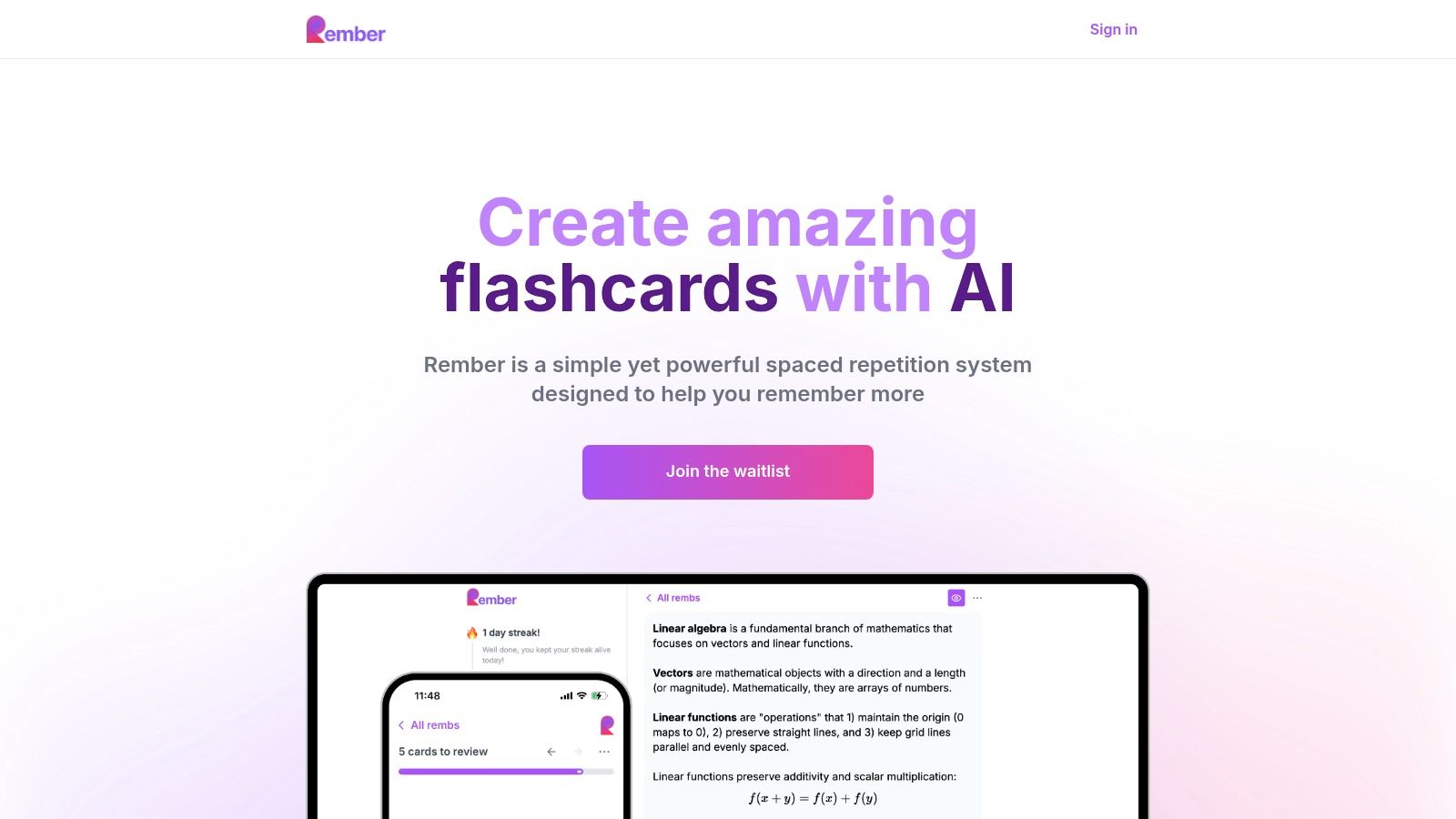
Why Rember Stands Out
Rember’s core differentiator is its AI-powered flashcard generation. Instead of manually creating each card, you can simply paste in your lecture notes, and the system suggests question-and-answer pairs. For example, after a history lecture, you could paste your notes about the Napoleonic Wars, and Rember might generate cards like "What was the significance of the Battle of Waterloo?" or "When was the Napoleonic Code established?". This is a significant time-saver, allowing you to focus on reviewing and learning rather than on tedious card creation.
Key Considerations
- Best For: Students and lifelong learners who want to minimize card creation time and prefer a sleek, modern user experience.
- Pros: Significantly reduces the time needed to create study decks, and features a user-friendly interface.
- Cons: Currently in a beta phase, so some features are still in development and its long-term pricing model is not yet public.
Website: https://www.rember.com/
10. Harken
Harken is a smart flashcard app that leverages spaced repetition and science-backed learning strategies to help you study more efficiently. It aims to simplify the creation and review process with a clean, user-friendly interface, making it a strong contender for learners who find traditional spaced repetition apps too complex or clunky. The app supports diverse content types, allowing for a richer, more engaging study experience.
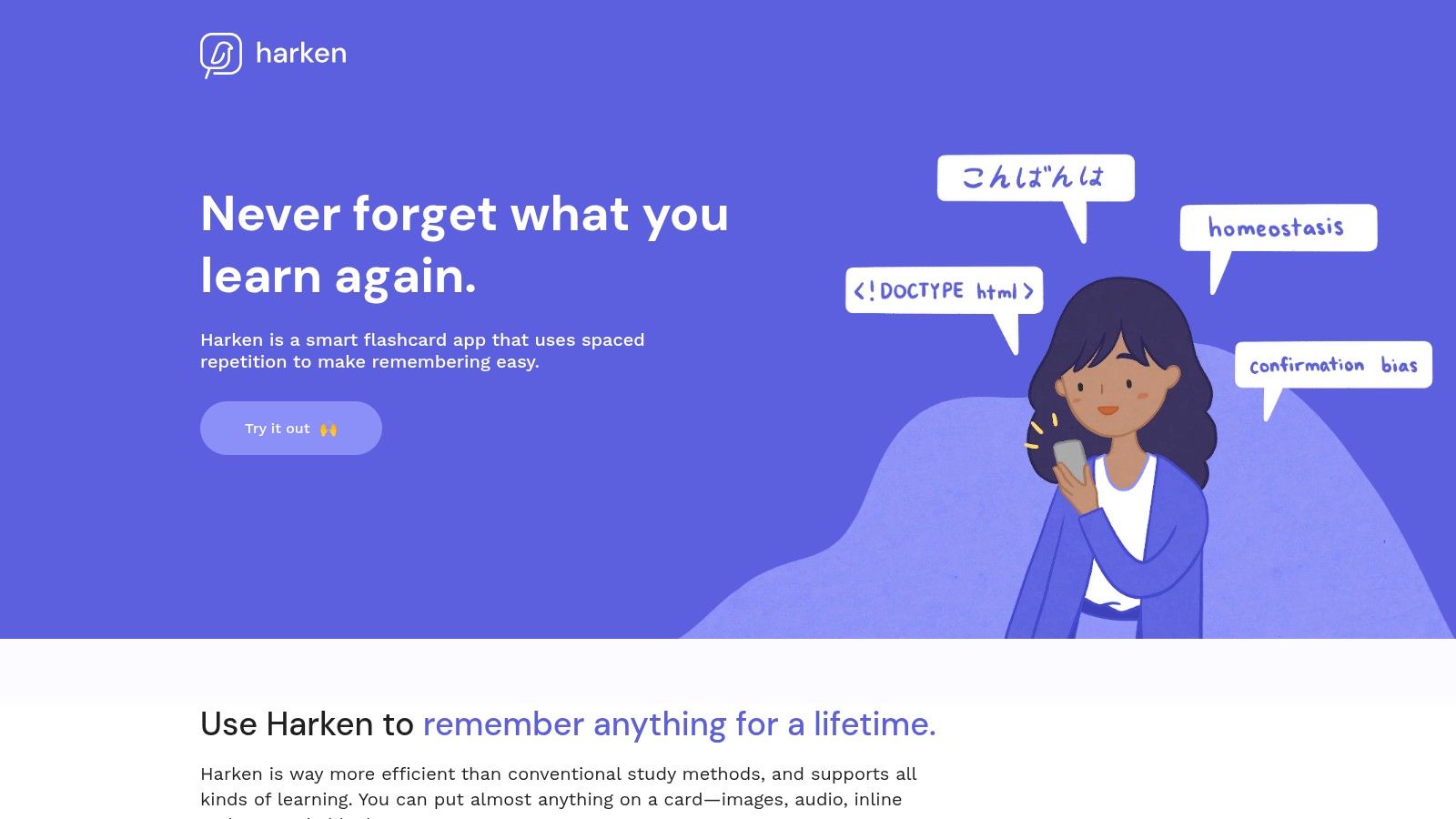
Why Harken Stands Out
What distinguishes Harken is its dedicated focus on combining an intuitive interface with flexible content support. You can easily create flashcards that include images, audio, and even properly formatted code snippets. This is a huge advantage for technical fields. For instance, a computer science student could embed a Python function on the front of a card and its output or explanation on the back, complete with audio narration explaining the logic. This multimedia approach makes abstract concepts more concrete and memorable.
Key Considerations
- Best For: Students and professionals who need to study diverse material, including code, and prefer a straightforward, modern interface.
- Pros: Supports multimedia flashcards (images, audio, code), emphasizes efficient study methods, and has a clean, user-friendly design.
- Cons: Less public information is available regarding pricing or platform availability, and it may not have the extensive customization add-ons found in more established tools.
Website: https://www.harkenapp.com/
11. Dorothy
Dorothy takes a minimalist and predictive approach to spaced repetition, focusing entirely on delivering daily quizzes to maximize retention. The platform's core algorithm is designed to predict your personal "forgetting point" for each piece of information, scheduling reviews just before you're likely to forget. This makes it an excellent choice for learners who want to trust the system and eliminate the guesswork from their study routine.
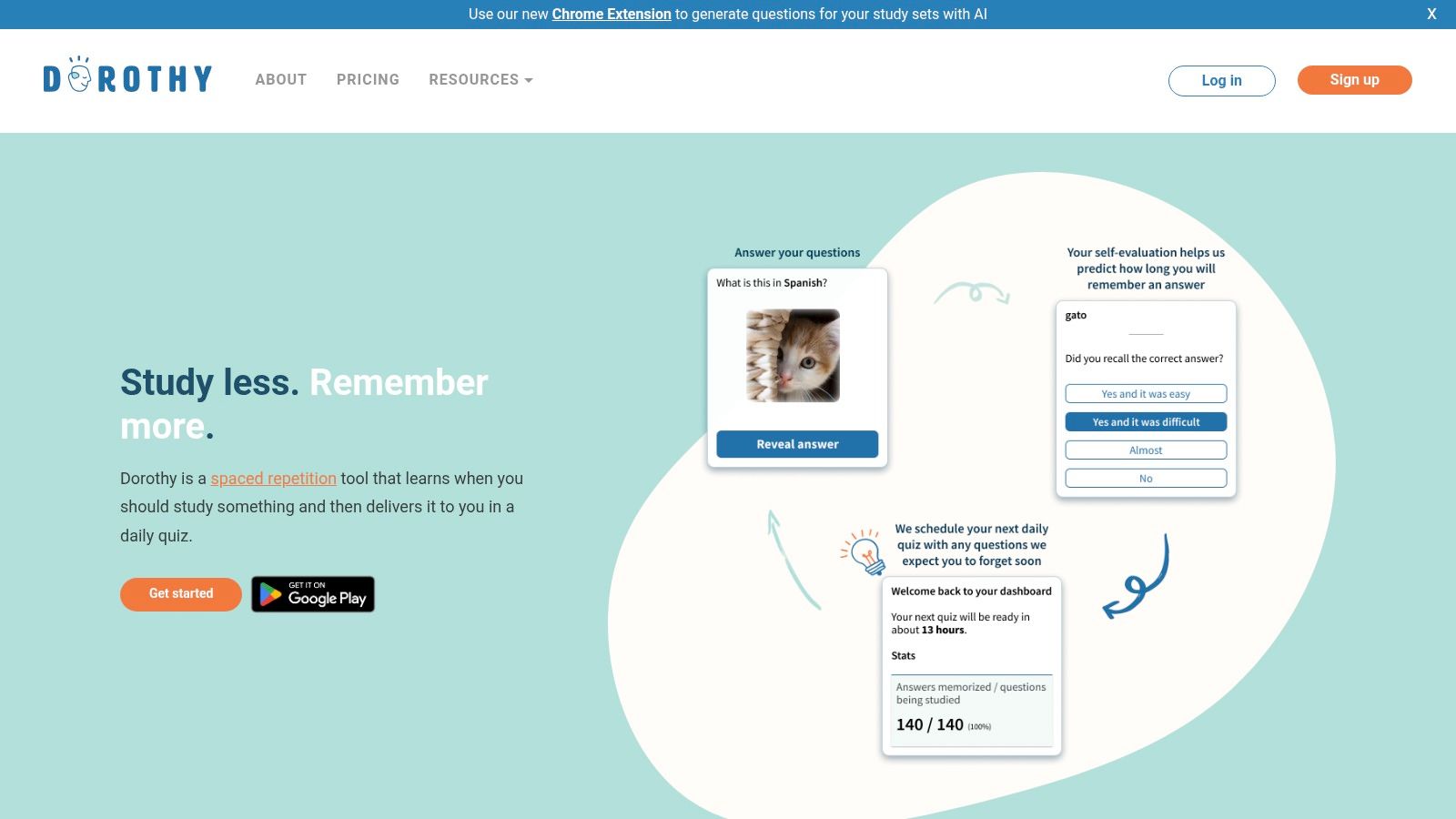
Why Dorothy Stands Out
What distinguishes Dorothy from other spaced repetition apps is its simplicity and hands-off nature. Instead of providing complex customization options, it offers a streamlined, quiz-focused interface. My personal experience with it felt less like a study tool and more like a daily brain-training game. A practical use case is for learning trivia or general knowledge: you input facts as you encounter them, and Dorothy handles the rest, serving you a quick 5-minute quiz each morning. This "less is more" philosophy is perfect for busy professionals who need an efficient, automated tool.
Key Considerations
- Best For: Learners who prefer a simple, automated daily quiz format and trust an algorithm to manage their reviews.
- Pros: Automates the entire review process based on forgetting predictions, and the simple interface promotes daily engagement without feeling overwhelming.
- Cons: Flashcard customization is very limited, and it may not be suitable for content that requires rich media like images or audio.
Website: https://dorothymemoryapp.com/
12. SmartCards+
SmartCards+ is a sleek, iOS-native flashcard app designed to bring the power of spaced repetition to Apple users with a clean and intuitive interface. It allows for the creation of multimedia-rich flashcards, incorporating images and audio to enhance learning. The app's primary strength lies in its user-friendly design, making it an accessible entry point for those new to spaced repetition systems who work exclusively within the Apple ecosystem.
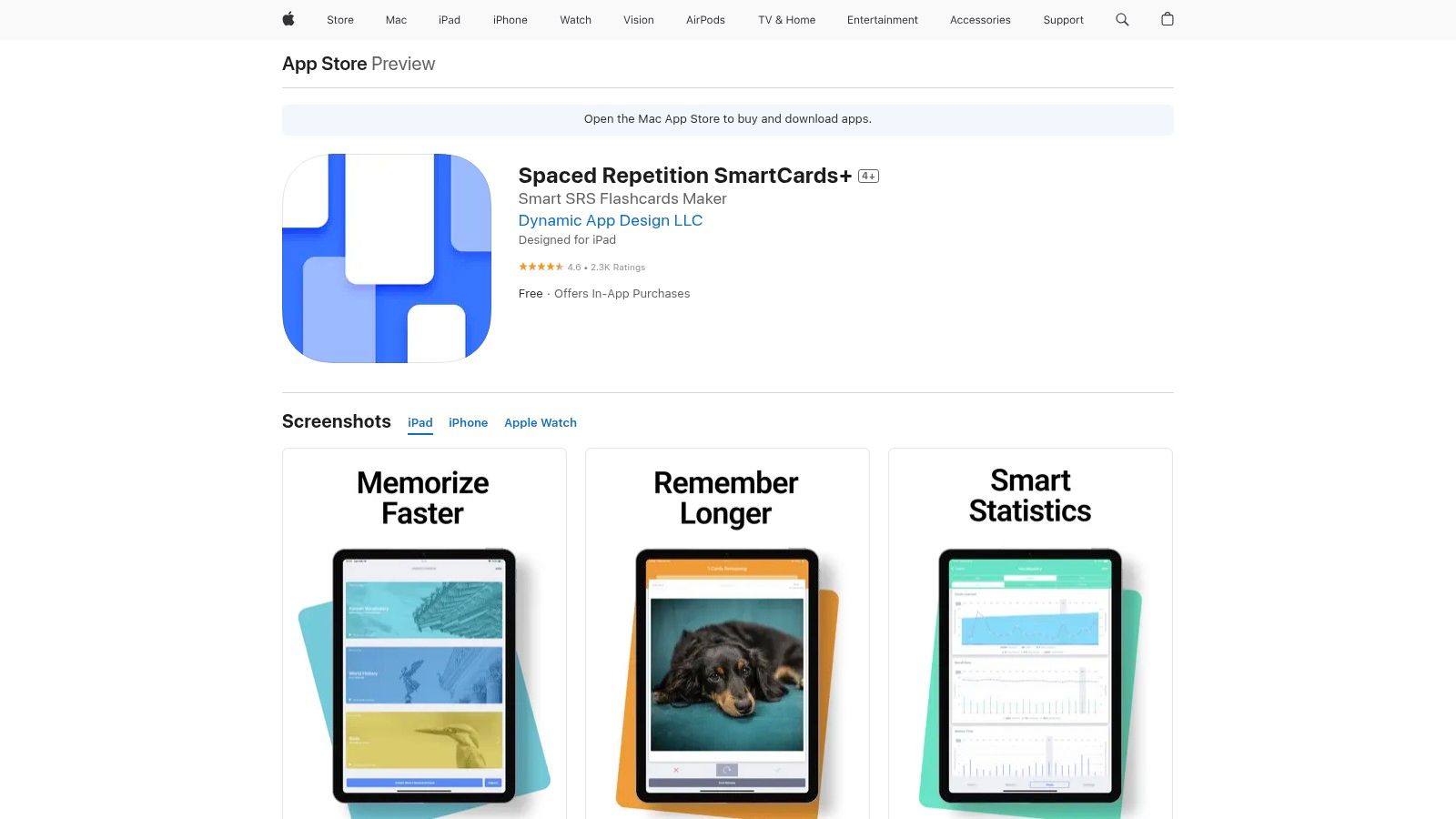
Why SmartCards+ Stands Out
What distinguishes SmartCards+ is its focus on interoperability and a polished user experience. It allows users to import existing decks from popular platforms like Anki and Quizlet. This is a huge practical benefit. For instance, I had hundreds of old Anki decks on my computer, but found the mobile interface clunky. With SmartCards+, I imported my most important decks and could review them on my iPhone with a much more pleasant, modern interface. This feature makes it a great companion app for those who may use other tools but desire a better mobile experience.
Key Considerations
- Best For: iOS users looking for a modern-looking spaced repetition app that can import decks from Anki or Quizlet.
- Pros: Highly user-friendly interface optimized for iOS, seamless integration with other major flashcard platforms, and robust progress tracking.
- Cons: Exclusive to the iOS ecosystem with no Android or web version available, and a subscription is required to unlock all features.
Website: https://apps.apple.com/us/app/spaced-repetition-smartcards/id1210521987
Spaced Repetition Apps Feature Comparison
| App | Core Features & Highlights | User Experience ★ | Value & Pricing 💰 | Target Audience 👥 | Unique Selling Points ✨ |
|---|---|---|---|---|---|
| Anki | Highly customizable; supports text, images, audio, LaTeX | ★★★★☆ Steep learning | Free desktop & Android; $24.99 iOS app | Language learners, med students | Large shared deck library 🏆; custom add-ons |
| SuperMemo | Incremental reading; advanced scheduling algorithms | ★★★☆☆ Outdated UI | One-time or subscription (varies) | Advanced learners, complex subjects | Pioneering spaced repetition software 🏆 |
| Memrise | User-generated courses; gamified learning with videos | ★★★★☆ Engaging | Freemium; some features require subscription | Casual language learners | Video content with native speakers ✨ |
| Brainscape | Confidence-based repetition; expert-verified flashcards | ★★★★☆ Modern & intuitive | Freemium with subscriptions | Students & groups | Collaboration & expert content ✨ |
| Mnemosyne | Multimedia support; detailed learning progress stats | ★★★☆☆ Basic UI | Completely free | Science-focused learners | Portable USB version; research focus ✨ |
| iDoRecall | Links flashcards to learning materials; collaboration | ★★★★☆ Seamless | Limited free; subscription required | Study groups, active learners | Contextual recall integration ✨ |
| Mochi | Markdown & multimedia support; offline-first with sync | ★★★★☆ Simple & flexible | Free with Pro subscription | Note-takers & flashcard users | Two-way linking notes & cards ✨ |
| Zorbi | Notion integration; Chrome extension for PDF/web flashcards | ★★★★☆ User-friendly | Freemium; subscription for full features | Notion users & web learners | Direct flashcard creation from PDFs/web ✨ |
| Rember | AI-generated flashcards; cloud sync; advanced scheduling | ★★★★☆ Modern interface | Beta; pricing TBD | Users seeking AI assistance | AI-powered flashcard creation ✨ |
| Harken | Multimedia flashcards; science-backed learning | ★★★☆☆ Efficient | Pricing unknown | Diverse learners | Supports code snippets; science-based ✨ |
| Dorothy | Predictive daily quizzes; minimal study time | ★★★☆☆ Simple quiz focus | Free or freemium | Time-conscious learners | Forgetting curve-based quizzes ✨ |
| SmartCards+ | Custom multimedia cards; import from Anki/Quizlet | ★★★★☆ iOS optimized | Paid iOS app; some subscription | iOS users only | Cross-platform deck import ✨ |
Final Thoughts
The journey through the world of spaced repetition apps reveals a powerful truth: the right tool can fundamentally change how you learn and retain information. We've explored a dozen powerful contenders, from the endlessly customizable Anki to the sleek, Notion-integrated Harken. The key takeaway isn't that one app reigns supreme, but that the best app is the one that seamlessly integrates into your existing workflow and personal learning style.
Remember, the goal is to make learning a consistent, low-friction habit. If setting up your system feels like a chore, you're less likely to stick with it. The most effective implementation of spaced repetition is the one you actually use day after day.
Making Your Choice: A Quick Recap
Choosing the right tool from this extensive list can feel daunting. Let's simplify the decision-making process with some actionable insights based on your primary needs:
- For the Power User & Tinkerer: If you crave ultimate control, aren't afraid of a steep learning curve, and want to customize every aspect of your learning, Anki remains the undisputed champion. Its vast ecosystem of add-ons makes it adaptable to nearly any subject.
- For the Dedicated Notion User: Your choice hinges on how deeply you want your flashcards embedded. For a native-Notion feel and simple toggles, Zorbi or Harken are excellent. For more robust features like bi-directional linking and a separate, dedicated review interface, Mochi or Rember might be a better fit.
- For the Visual & Auditory Learner: If your study materials are rich with images, videos, and audio clips, apps like Memrise (with its native speaker videos) or iDoRecall (with its direct video and PDF linking) are designed for your learning style.
- For the Student Under Pressure: When efficiency is paramount, Brainscape stands out. Its "Confidence-Based Repetition" system is scientifically optimized to help you master large volumes of information quickly, making it ideal for exam prep.
Beyond the App: Keys to Success
Ultimately, your success with spaced repetition apps depends less on the specific software and more on your approach. Keep these principles in mind:
- Create Atomic Notes: Follow the principle of minimum information. A bad card is: "What is photosynthesis and why is it important?" A good card is: "What is the primary green pigment in plants? -> Chlorophyll." Each card should test a single, discrete piece of knowledge.
- Be Consistent: A little bit every day is far more effective than a long session once a week. I built my habit by tacking my 15-minute review session onto an existing habit: making my morning coffee. This consistency is what makes the algorithm work its magic.
- Trust the Algorithm: Resist the urge to review cards ahead of schedule or manually override the system. The spaced repetition schedule is designed to challenge your memory at the optimal moment. Trust the process.
The search for the perfect study tool is a personal one. We encourage you to experiment with a few of the options we've discussed. Use their free trials, create a small deck of cards on a subject you know well, and see which interface feels most intuitive. This small investment of time will pay massive dividends in your learning efficiency and long-term knowledge retention.
If your learning workflow revolves around academic papers, textbooks, and detailed PDF documents, you know the friction of manually creating flashcards. PDFFlashcards is designed to eliminate that step, allowing you to generate high-quality, targeted flashcards directly from your PDFs in seconds. Turn your reading material into a powerful, reviewable knowledge base by visiting PDFFlashcards to streamline your study process.